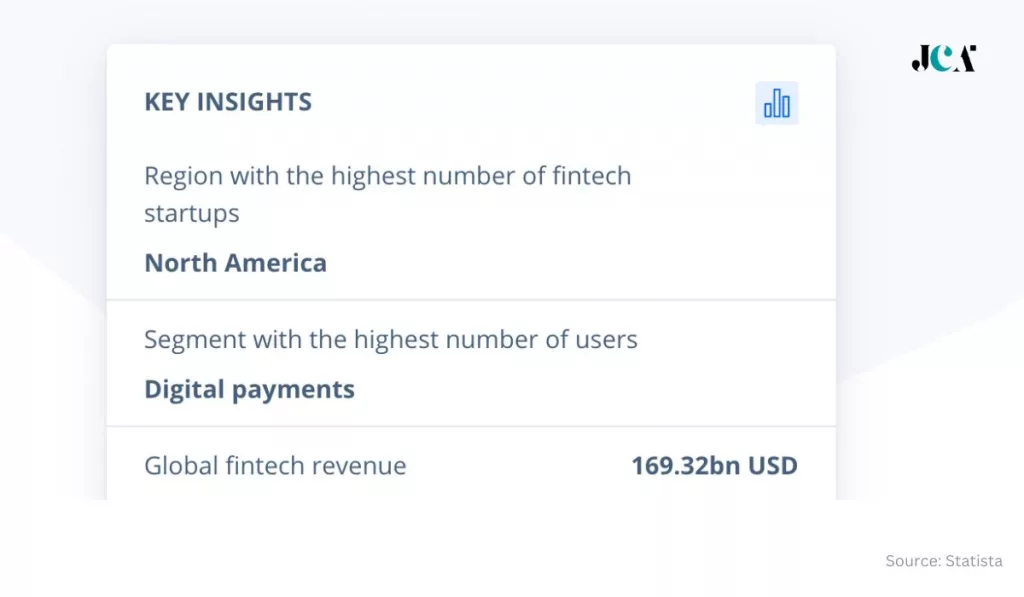As we edge closer to 2025, the fintech landscape is buzzing with a fresh wave of innovations destined to redefine our financial experiences. I’ve curated a list of the top 11 fintech trends that are anticipated to make waves in 2025.

The global fintech market is forecasted to grow at a compound annual growth rate (CAGR) of 16.8% from 2025 to 2032, reaching a market value of USD 917.17 billion by 2032 from approximately USD 226.76 billion in 2023.
Let’s unravel the top 12 fintech trends together, shall we?
- 1. Decentralized Finance (DeFi)
- 2. Artificial Intelligence (AI) and Machine Learning (ML)
- 3. Open Banking
- 4. Digital Banks and Neobanking
- 5. Cybersecurity
- 6. Customer Engagement
- 7. Internet of Things (IoT)
- 8. Sustainable Finance
- 9. Quantum Computing
- 10. WealthTech
- 11. Software as a Service (SaaS)
- 12. Blockchain Technology
1. Decentralized Finance (DeFi)
Decentralized Finance (DeFi) is dismantling the traditional financial infrastructures by allowing peer-to-peer transactions sans any intermediaries like banks. It’s a realm where financial services are accessible to everyone without any barriers. This democratization of finance is not only empowering individuals but is also fostering a new era of financial inclusivity.
How is DeFi revolutionizing the fintech sector?
- Disintermediation: Eliminates the need for middlemen, thus reducing costs and enhancing transaction speed.
- Financial Inclusivity: Provides access to financial services to unbanked populations.
- Transparency: Blockchain, the underlying technology of DeFi, ensures transparency and trust in financial transactions.
Also read: Top DeFi Development Companies In The World To Hire
2. Artificial Intelligence (AI) and Machine Learning (ML)
From streamlining mundane tasks to powering intelligent financial solutions, AI and ML are the new stalwarts in the fintech domain. Financial entities are harnessing AI to automate customer verification processes, creating a smooth pathway for customer onboarding. On the flip side, ML is playing a pivotal role in analyzing tons of data to churn out actionable insights, thus forming the backbone of many fintech solutions like financial chatbots and robotic advisors.
Why is this trend significant for the fintech sector?
- Automation: Automation of repetitive tasks enhances operational efficiency and customer satisfaction.
- Precision: AI and ML drive precise decision-making, making financial operations more reliable and efficient.
- Personalization: Tailoring financial products based on customer behavior is now possible, thanks to AI.
Trending blog: Awesome AI Tools To Try | Best AI Apps and Software to Use Now
3. Open Banking
Open banking is reshaping the financial ecosystem by promoting data sharing between banks and third-party financial service providers. It’s a shift towards a more transparent and customer-centric banking model where you have better control and insight into your financial data.
Why is Open Banking a Game-Changer in Fintech?
- Customer Empowerment: Gives customers control over their financial data.
- Innovation: Facilitates the development of new financial products and services.
- Collaboration: Fosters collaboration between traditional banks and fintech startups.
Also read: 4 Key Steps Toward Finance Modernization for Banks
4. Digital Banks and Neobanking
Digital banks and neobanks are sprouting as the modern-day alternatives to traditional banking. With a smartphone in every pocket, banking services are now accessible anytime, anywhere. Neobanks, devoid of any physical branches, are offering a fresh, hassle-free banking experience.
What makes digital banks and neobanks the future of banking?
- Accessibility: Offers banking services at your fingertips.
- Low Operational Costs: Lack of physical infrastructure reduces operational costs, translating to lower fees for customers.
- Customer-centric Services: Tailored banking services based on customer preferences and behaviour.
5. Cybersecurity
As the digital footprint of the financial sector expands, so does the potential threat from cyber adversaries. Cybersecurity in fintech is no longer a choice but a necessity. With rising incidents of data breaches and fraud, robust cybersecurity measures are the bulwark against potential financial calamities.
How is Cybersecurity Upholding the Fintech Fortress?
- Trust Building: By ensuring data protection and financial safety, cybersecurity builds trust between fintech providers and users.
- Regulatory Compliance: Adhering to cybersecurity standards helps in meeting regulatory requirements, a critical aspect of fintech operations.
- Fraud Prevention: Effective cybersecurity measures nip fraud in the bud, ensuring smooth financial transactions.
Also have a look at: 7 Tips to Protect Your Business from Cyber Threats
6. Customer Engagement
Engaging customers effectively is the cornerstone for success in the fintech sector. By leveraging technologies like AI, IoT, and voice-enabled services, fintech is crafting personalized experiences. It’s all about understanding your needs and preferences to offer tailored financial solutions.
Importance of Customer Engagement in Fintech?
- Retention and Growth: Engaged customers are likely to stay and explore more services, driving growth.
- Feedback Loop: Continuous engagement helps in gathering valuable feedback for improving services.
- Personalization: Enhances service delivery by aligning with customer expectations and preferences.
7. Internet of Things (IoT)
The amalgam of IoT and fintech is weaving a new narrative in customer service. IoT devices are becoming the new touchpoints for financial service delivery, enabling real-time data collection and personalized service offerings.
You may like reading: How to Create An IoT App – Time, Cost, and Resources You Need
The role of IoT in Transforming Fintech
- Real-time Data: Enables real-time data collection which is crucial for decision-making in financial services.
- Customer Experience: Personalized services based on data collected from IoT devices enhance the customer experience.
- Operational Efficiency: IoT can streamline operations, making financial service delivery more efficient.
8. Sustainable Finance
Finance with a conscience is the mantra of sustainable finance. It’s about aligning financial services with broader societal and environmental goals. The preference for banks that support high-impact projects is steering the growth of sustainable financing in fintech.
Why is Sustainable Finance Gaining Traction?
- Social Impact: Contributes to societal well-being by supporting impactful projects.
- Investor Attraction: Attracts a new genre of investors who are keen on responsible investing.
- Long-term Sustainability: Fosters long-term sustainability by aligning financial operations with global sustainability goals.
9. Quantum Computing
Quantum computing is the futuristic tech poised to redefine the realms of financial forecasting and risk management. With the potential to process complex transactions and data sets in a fraction of a second, quantum computing is a boon for the fintech sector.
How Can Quantum Computing Elevate Fintech?
- Enhanced Predictability: Quantum computing can significantly enhance market predictability and financial forecasting.
- Risk Management: Improves risk assessment and management through rapid data processing.
- Operational Efficiency: By speeding up data processing, it enhances operational efficiency in the fintech sector.
10. WealthTech
WealthTech is a burgeoning facet of fintech, bringing a blend of technology and financial expertise to the realm of wealth management. With automated platforms offering sophisticated, yet user-friendly solutions for managing investments, WealthTech is democratizing wealth management, making it accessible to the masses.
Why is WealthTech a Noteworthy Trend in Fintech?
- Democratization of Wealth Management: Provides tools and platforms that make wealth management accessible to a wider audience.
- Automated Efficiency: Automated platforms in WealthTech ensure efficient management of investments with minimal manual intervention.
- Personalized Financial Planning: Offers tailored financial planning solutions based on individual risk tolerance and financial goals.
11. Software as a Service (SaaS)
The SaaS model in fintech is a catalyst for transformative shifts, offering cloud-based services that optimize financial processes and enhance service delivery. For instance, platforms offering loan management solutions are leveraging AI to streamline borrower onboarding and assessment processes, thereby improving loan processing speeds and reducing costs.
How is SaaS Shaping the Fintech Landscape?
- Cost Efficiency: SaaS solutions often come with a pay-as-you-use model, making them cost-effective for small and medium-sized enterprises.
- Scalability: The flexibility to scale services based on demand is a hallmark of SaaS solutions in fintech.
- Innovative Solutions: SaaS is enabling the launch of innovative fintech solutions, driving competition and growth in the sector.
12. Blockchain Technology
Blockchain technology, with its decentralized and transparent nature, is carving a niche in the fintech sector. Its ability to provide a secure and immutable ledger for transactions makes it an invaluable asset for modern financial services. Blockchain is the backbone of cryptocurrencies like Bitcoin and Ethereum, but its application in fintech goes beyond that. It’s fostering trust, transparency, and efficiency in financial transactions, all while reducing the cost associated with intermediaries.
Blockchain Technology a Cornerstone in Fintech Sector
- Transparency and Trust: The transparent nature of blockchain fosters trust among users as all transactions are recorded and visible to all parties involved.
- Cost Efficiency: By eliminating the need for intermediaries, blockchain significantly reduces the cost of transactions.
- Security: The immutable and encrypted nature of blockchain makes it highly secure against fraud and unauthorized alterations.
- Smart Contracts: Blockchain facilitates the use of smart contracts which automate contractual processes, saving time and reducing disputes.
- Tokenization: Asset tokenization on blockchain opens up possibilities for fractional ownership and easier transfer of assets, thereby democratizing asset ownership.
As we traverse through 2025, these fintech trends are set to reshape the financial ecosystem, making it more inclusive, efficient, and customer-centric. The blend of groundbreaking technologies and innovative business models is not only enhancing the way we interact with financial services but is also opening avenues for sustainable and socially responsible finance. So, whether you’re a fintech enthusiast or a casual observer, the evolving fintech landscape is something to keep an eye on. The future of finance is unfolding, and it’s exhilarating!










Leave a Reply